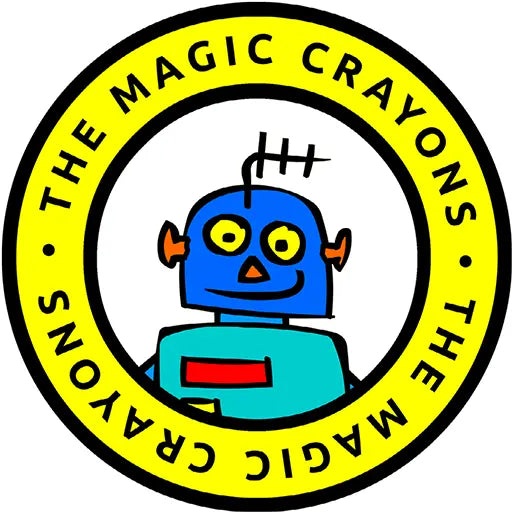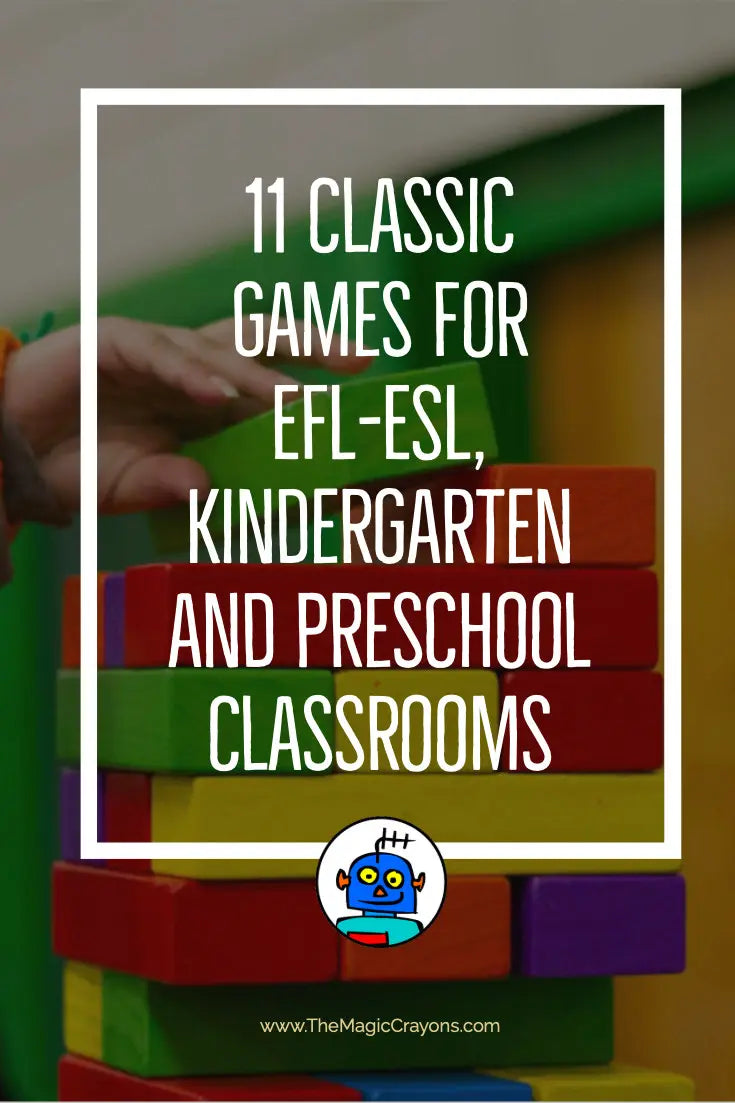>Games >Classic Games
-
1. Duck Duck Goose
Resources
How to play
Time: 8-10 minutes
Receptive Language: instructions, flashcard vocab
Productive Language: flashcard vocab
Students sit in a circle. Demonstrate the game by slowly walking around the outside of the circle, lightly tapping each student on the head while saying “Duck...duck...duck...” When you get to the Japanese teacher, tap her on the head and yell “Goose!” You and the teacher must then race (in opposite directions) around the circle, trying to be the first to make it back to the teacher’s original spot. Let her win, express your disappointment, and continue. Try and make sure that all of the students get a chance to be “It.”
Note: This game is easily adapted to any unit’s vocabulary, i.e. “Hamburger ...hamburger ... chicken!” etc.
-
2. Riverbank
Resources
- Vinyl Floor Tape (Amazon #Ad)
-
How to play
Have students sit down at one side of the classroom and, using either tape or books, make a line on the classroom floor. Have either the boys or the girls (if it’s a big class; if not, all the students at once) form a line parallel to the line you’ve created on the floor.
Have the students jump over the line two or three times on your command, with one or two “Stop!”s thrown in instead. Demonstrate that one side of the line corresponds to a card in your right hand (happy) and the other side to the card in your left hand (hungry) and that the students will have to jump to whichever side you call out.
Any students that jump at the wrong time have to sit down until there are only a few left.
-
3. Ghost Game
Resources
How to play
Time: 5-7 minutes
Productive Language: Unit vocabulary
Game Explanation: Introduce the ‘ghost’ card. Demonstrate to the students that any time this card is revealed you will turn into a hungry, student-gobbling ghost & that the only place that they’ll be safe is in a corner at the far side of the room. Review whatever cards you want to focus on, occasionally revealing the ‘ghost’ card & chasing the students to the corner. If you like, capture one or two students each time & have them join you as a ‘teacher’ & occasional ghost. -
4. Four Corners
Resources
How to play
Time: 6-8 minutes
Receptive Language: instructions, flashcards, run, stop
Productive Language: none
Game Explanation: Give each corner of the classroom a vocab-related name (or prop a card in each corner). Yell ‘Go!’ or ‘Run!’ Students run around the room until you say ‘Stop.’ As soon as you tell them to stop they must stand in one of the corners. With your eyes averted, call out one of the corner names. All of the students in that corner must sit down. Continue until only a handful of students remain.
Note: Based on an activity that was enormously popular at Canadian ‘roller rinks’ in the mid-80s. Probably. Really easy to play this every week. So don't. -
5. Fly Swatting
Resources
- Flash Cards
- Fly Swats (Amazon)
How to play
Time: 5-8 minutes
Receptive Language: instructions, flashcard vocab
Productive Language: flashcard vocab
Game Explanation: Buy some 100 yen fly swatters (one per team). Call out a card. The students race to the card pool & swat the card you’ve called. Easy-peasy, but more fun than you’d think. -
6. Fruit Basket
Resources
How to play
Time: 8-10 minutes
Receptive Language: instructions, target vocab
Productive Language: target vocab
Game Explanation: Give each student a target vocab-themed card or necklace, making sure that there are several students for each item/term, & have the children sit in a circle on chairs, with you in the middle. Call out a vocabulary term (‘Banana!’). Any student with a banana card or necklace has to get up & change seats while you try to sit down in any (temporarily) vacant chair. Whoever is left without a chair must stand in the middle & call out the next item. If the person in the centre calls out ‘Fruit basket!’ or ‘Crazy time!’ (or whatever term you’ve decided to use), everyone must change seats.
-
7. This Is Bus Crazy!
Resources
-
How to play
Time: 5 minutes
Receptive Language: instructions, various
Productive Language: flash card vocab
Game Explanation: Become a bus by ‘driving’ around the room, stopping to pick up students & only allowing them to ‘board’ (i.e. form a train behind you) if they can correctly identify a flash card. Repeat until all of the students are aboard. Ride around the room & crash dramatically into stuff as part of the big, crazy finale.
-
8. What's Missing - Magic Envelope
Resources
How to play
Magic Envelope
Time: 5-8 minutes
Receptive Language: ‘What’s missing?’
Productive Language: unit vocabulary
Game Explanation: Show the students a manageable number of flash cards & have them repeat them after you. Have the students look away or close their eyes (though, as this may be difficult, especially with younger students, you might want to simply indulge in some sleight-of-hand) while you remove one or two cards and place them in the Magic Envelope. The first student (or students) to correctly identify which cards are missing scores a point / gets to keep the card.
Note: This game is easily adapted to a Team version. -
9. Ostrich Dance Or The Headless Chicken Game
Resources
- Flash Cards
- Clothes Pegs (Amazon #Ad)
How to play
Time: 6-10 minutes
Receptive Language: instructions
Productive Language: flashcard vocab
Game Explanation: Attach cards to the backs of two students. The first student to identify the card on his opponent’s back is the winner. The students are not allowed to touch each other (you will probably have to enforce this rule). You may also have to penalize students who play a strictly defensive game. -
10. Hide The Cards
Resources
How to play
Time: 10-12 minutes
Receptive Language: ‘Find the cards!’, English hints
Productive Language: unit vocabulary
Game Explanation: Review the unit cards you want to focus on. Have the children leave the room. Hide the cards around the classroom. Invite the children back in & demonstrate that the cards are gone & that the students must find them for you. Make sure that the students identify each card they discover. They may ask you for hints, which you should feel free to give them, especially if you can work in some of the classroom object vocabulary (‘It’s under the book’, etc). -
11. Showdown
Resources
How to play
Time: 5-7 minutes
Receptive Language: instructions
Productive Language: flash card vocab
Game Explanation: Two students, each holding a card, stand back to back. On your command (& counting together, if you like), the students take 3 steps away from each other, turn around on the third step & ‘draw’ their cards. The first student to identify the other student’s card wins the duel.
Like it? Share it!
Best selling gifts
-
Backhoe Trucker Cap, Adult C004
Vendor:The Magic CrayonsRegular price $30.00 USDRegular priceUnit price per -
Personalized Yellow 8-Wheeled Crane Mug
Vendor:The Magic CrayonsRegular price From $20.00 USDRegular priceUnit price per -
Unisex Hypoallergenic Cuffed Beanie with Embroidered Forklift - Perfect for Drivers and Operators
Vendor:The Magic CrayonsRegular price $27.50 USDRegular priceUnit price per -
Forklift Certified Trucker Hat In 13 Colors
Vendor:The Magic CrayonsRegular price $30.00 USDRegular priceUnit price per







